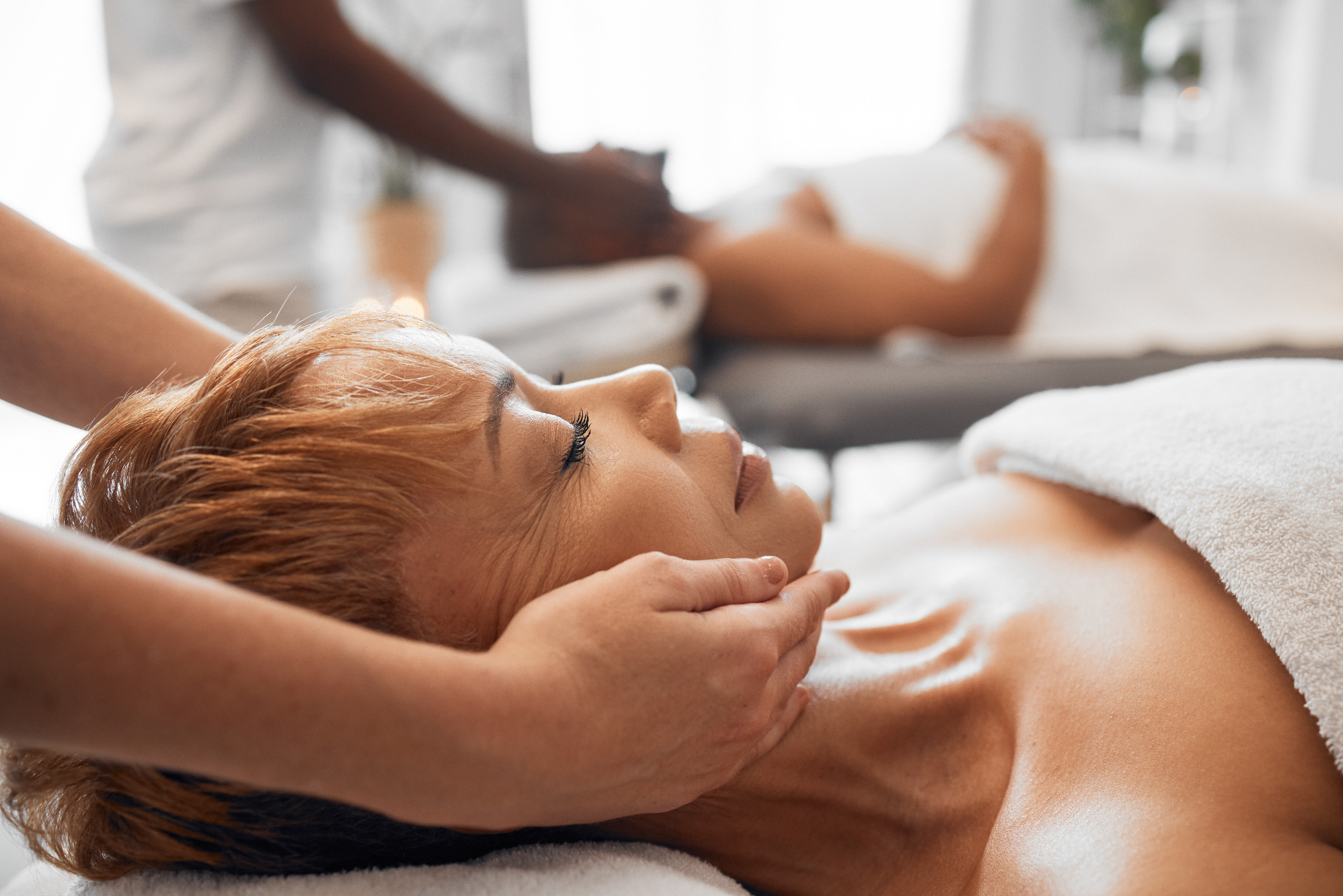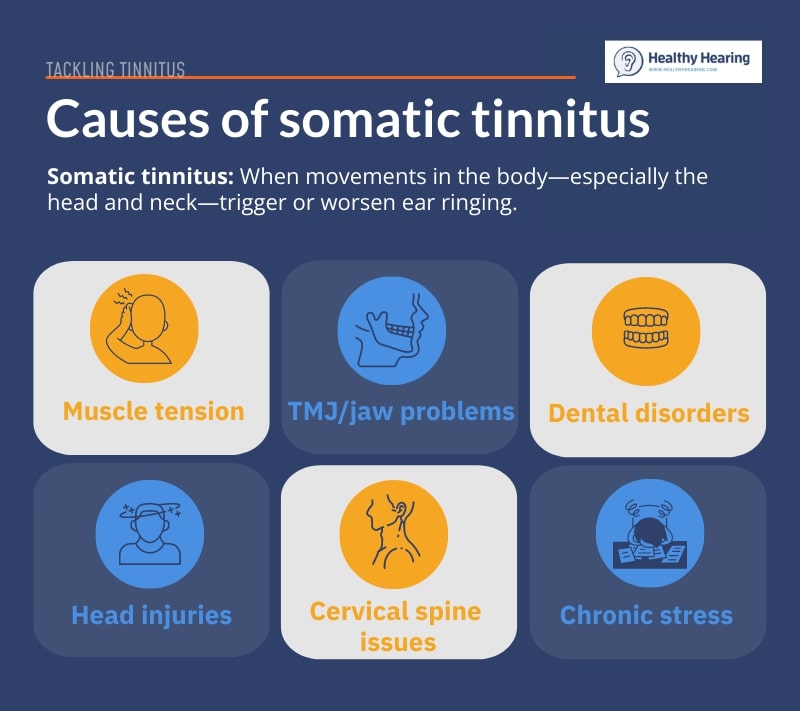|
www.HealthyHearing.com |
What is somatic tinnitus? Causes, treatments, and coping strategiesFor many, movement in the body can trigger or worsen ear ringing
Contributed by Glenn Schweitzer When most people think of tinnitus, they think “high-pitched ringing in the ears,” but the noises and individual experiences vary wildly from person to person. 
In my experience as a tinnitus coach, I’ve worked with patients who have heard every type of sound (and combinations of sounds) that you can imagine. Buzzing, whooshing, roaring, hissing, clicking, and musical notes are all common tinnitus sounds that can be perceived as being in one or both ears, in the head, or around the head. There are also a variety of different subtypes of tinnitus. What is somatic tinnitus?One of the most common types of tinnitus (and the type of tinnitus I’ve had for the last 13 years) is known as somatic tinnitus or somatosensory tinnitus. It’s characterized by hearing sounds that are connected to movement and body position. If you have tinnitus and the sound changes in some way when you tense, manipulate, or apply pressure to the muscles in your face, head, jaw, or neck then you likely have somatic tinnitus. The good news is that there are many coping strategies and treatments that are uniquely helpful for somatic tinnitus patients, and there is also nothing about somatic tinnitus that would ultimately prevent you from finding lasting relief through habituation. Related: Reactive tinnitus, or ear ringing triggered by noise What causes it?It is still unclear exactly what causes somatic tinnitus, but it is commonly believed to be caused by the interaction between the auditory system and sensory signals emanating from the muscles, joints, and nerves of the head and neck. One of the most prevalent theories for somatic tinnitus has to do with the presence of somatosensory nerves around the face, neck, and jaw that connect to a part of the brain known as the dorsal cochlear nucleus (DCN). The DCN helps you locate where sounds are coming from in your environment, and it is also one of the many regions of the brain involved in the perception of tinnitus. Some researchers believe that the DCN may even be where tinnitus first arises in the brain. A 2012 study published in the journal Brain Research analyzed the existing research data and found evidence that supports this theory. But even if this theory is wrong, the research seems to show that the DCN is at least involved with tinnitus perception in some capacity.
The role of muscle tensionWhen you tense (or have tension in) the muscles of your jaw, head, face, or neck, you are manipulating and stimulating these somatosensory nerves and potentially over-stimulating the neurons in DCN. Somatic tinnitus patients often find that certain body or facial movements and postures can affect the intensity and quality of the sound of their tinnitus. Yawning, moving the jaw, tensing the muscles of the head or neck, turning the head in specific directions, or even applying pressure to specific areas of the face are all common examples of movements that can influence a person’s experience of somatic tinnitus. Sometimes, specific movements will cause somatic tinnitus to change for the better, sometimes for the worse. Conditions that can cause or worsen somatic tinnitusThere are many conditions that can cause and exacerbate somatic tinnitus. And while we may not understand the exact underlying physiological or neurological mechanisms at play, effective treatment of these conditions can often lead to big improvements in tinnitus intensity. Temporomandibular joint dysfunction/disorder (TMJ/D)The temporomandibular joint is a ball and socket joint that connects the lower jaw to the upper skull. When there is dysfunction, misalignment, or inflammation in the joint, it can not only cause and exacerbate somatic tinnitus, but it can cause intense pain as well as other vestibular symptoms such as vertigo, fluctuating dizziness, disequilibrium, ear fullness, ear pain, and hearing loss. Interestingly, Meniere’s disease is a somewhat common misdiagnosis for severe TMJ/D. Fortunately, if you have somatic tinnitus and TMJ/D, treatment can often lead to big improvements in tinnitus (and any other TMJ/D symptoms you may be experiencing). Neuromuscular dentists are the specialists that treat TMJ/D, and treatment involves the use of orthotic appliances to correct jaw and teeth alignment. If you are experiencing somatic tinnitus as well as jaw pain, jaw tension, jaw clicking, popping, or lock jaw, it is worth scheduling an initial consultation with a neuromuscular dentist. The only downside is that TMJ/D treatment is not covered by most health insurance plans in the US and can be very expensive, costing between $7,000-$10,000 on average. Other potentially less expensive treatments include Botox injections, physical therapy, and massage. Other dental disordersOther dental disorders, such as bruxism (teeth clenching/grinding), malocclusion (bad alignment of teeth), and dental injuries can all contribute to somatic tinnitus. Your regular dentist can help to treat all of these issues, and treatment can often lead to a reduction in tinnitus intensity. Bruxism, especially the teeth clenching variety, is a neurological stress response that can happen during the day, night, or both. Constant teeth clenching can lead to fatigued, tired, and sore jaw muscles, and jaw muscle tension is one of the most common triggers of somatic tinnitus. For clenching and grinding during sleep, custom bite guards are highly effective and can be made by and purchased from your regular dentist. Clenching during the day can be improved through behavioral training. Cervical spine issuesCertain medical problems in the cervical spine, such as herniated discs and degenerative disc disease, can affect the nerves and muscles in and around the neck leading to somatic tinnitus. Finding a great orthopedic doctor to treat these issues, to the extent that it is possible in any individual case, can sometimes lead to improvements in somatic tinnitus. Physical therapy can often be helpful in reducing tinnitus as well, as it can help to correct muscle imbalances and alleviate pain that stems from cervical spine issues. Head and neck injuryTrauma and injury to the head or neck is a common trigger of somatic tinnitus (and hearing loss and dizziness). Traumatic brain injuries, whiplash injuries, concussions, muscle sprains, and spinal injuries can all impact the muscles, joints, and nerves around the head, neck, and face, causing or worsening somatic tinnitus. Chronic stressMuscle tension and muscle spasms in your head, face, jaw, neck, or upper back muscles can all affect somatic tinnitus. Poor posture, muscle weakness, and muscle imbalances can all cause severe muscle tension, but chronic stress is often the worst offender. Stress finds its way into the body as tension, aches, pains, and discomfort, and it tends to accumulate in the face, head, neck, shoulders and upper back for many people. Addressing muscle tension issues with bodywork, strength training, physical therapy, and other mind body techniques can sometimes lead to big improvements in somatic tinnitus. Somatic tinnitus coping strategiesIf you suffer from somatic tinnitus, medical treatment for any health condition or issue that is causing or exacerbating your tinnitus is always the most important first step. Treatments vary by condition, and so finding the right specialist is crucial. There are also many coping strategies and techniques that are uniquely helpful for somatic tinnitus patients. Because facial, head, and neck muscle tension is ultimately at the root of many of the causes of somatic tinnitus, taking steps to reduce muscle tension can lead to big results. Bodywork practices, such as massage, craniosacral therapy, Rolfing therapy, acupuncture, and acupressure can all potentially help to relax your muscles and alleviate the intensity somatic tinnitus. Body scan meditations are also very useful as they can help to increase your somatic (mind-muscle) awareness. By learning to consciously release tension from the muscles that you didn’t even know you were tensing, you can start to reduce physical stress in a way that can be very therapeutic for somatic tinnitus patients. One of my favorite guided body scan meditations is “Physiological Quieting” and is available on Amazon Music. There are also many products, tools, and supplements that can help to alleviate physical muscle tension in your face, head, and neck. In a previous Tackling Tinnitus column, I detailed many of these products such as the temple massager (a facial massage tool that is effective at reducing jaw and facial muscle tension), heating pads, massage guns, and kava tea (which has a mental and physical stress relieving effect). Jaw massage techniques
reducing somatic tinnitus. Jaw massage techniques are helpful for many somatic tinnitus patients, and you don’t need to buy any special tools or products to get the benefits. You can find a variety of helpful techniques online, but here are two of my favorites jaw massage techniques. Just make sure to use very light pressure when first trying these techniques):
Jaw relaxation exerciseLearning to deliberately release tension in your jaw muscles can be extremely beneficial for somatic tinnitus patients as well. Here is a simple relaxation exercise that you can practice: (Click here to watch me teach a guided version of this technique)
Clenching awareness exerciseIf you experience bruxism, and are a clencher like me, you can learn to catch yourself and become more mindful of your clenching, by practicing the following clenching awareness exercise:
My experience with somatic tinnitusMy baseline tinnitus sound is a somewhat loud, high-pitched tone hovering around 3500 hertz. I have been fully habituated to the sound for more than 12 years now, and so it doesn’t bother me or negatively affect my quality of life. I rarely even notice it throughout most days and when I do, nothing happens. But my tinnitus is somatic, and I also have Meniere’s disease, both of which cause my tinnitus to fluctuate constantly. Jaw and neck muscle tension are the two biggest somatic triggers for me. When I tense or manipulate my jaw or neck muscles, my tinnitus significantly increases in both volume and intensity until I release the tension. Thanks to habituation, this too does not bother me or affect me negatively. I’m also a very active person who exercises a lot, and I’ve had many injuries over the years. I’ve had neck issues, shoulder problems, and osteoarthritis. Many of these injuries have affected my somatic tinnitus, triggering big spikes throughout the years. It never knocked me out of habituation, but it’s something I experienced over and over. Physical recovery, massage, and stretching have become a big part of my selfcare routine. My biggest somatic issue is bruxism. I am clencher who clenches both day and night and the more stressed I get, the worse it becomes. Because of this, my jaw muscles easily become tight and fatigued and I often have to make a concerted effort to relax and massage my jaw throughout the day. I talk a lot every day too while working with tinnitus patients, which tends to exacerbate my jaw muscle tension. Multipronged approachI know many sufferers are struggling right now with somatic tinnitus and dealing with many of the same issues I’ve faced over the years. But the good news is that the challenges of living with somatic tinnitus are not insurmountable obstacles standing in the way of finding relief. I’m living proof that you can fully habituate to somatic tinnitus and remain habituated over a long period of time. The key is incorporating many tools into your tinnitus toolbox. If you or someone you love is suffering from somatic tinnitus, hopefully some of these suggestions and tips will help to reduce the intensity. Glenn Schweitzer
|
Featured clinics near me
Earzlink Hearing Care - Reynoldsburg
7668 Slate Ridge Blvd
Reynoldsburg, OH 43068

Find a clinic
We have more hearing clinic reviews than any other site!



 Glenn Schweitzer is an entrepreneur, blogger, and the author of Rewiring Tinnitus and Mind over Meniere’s. He is passionate about helping others who suffer from tinnitus and vestibular disorders and volunteers as an Ambassador Board Member for the Vestibular Disorders Association (VEDA). Through his blogs, he continues to raise awareness for tinnitus, Meniere’s disease, and other vestibular disorders, spreading his message of hope to those in need.
Glenn Schweitzer is an entrepreneur, blogger, and the author of Rewiring Tinnitus and Mind over Meniere’s. He is passionate about helping others who suffer from tinnitus and vestibular disorders and volunteers as an Ambassador Board Member for the Vestibular Disorders Association (VEDA). Through his blogs, he continues to raise awareness for tinnitus, Meniere’s disease, and other vestibular disorders, spreading his message of hope to those in need.